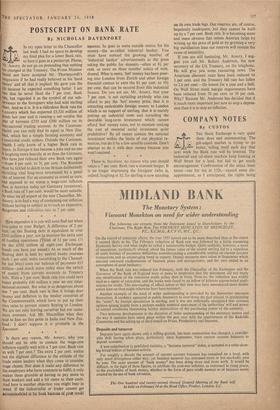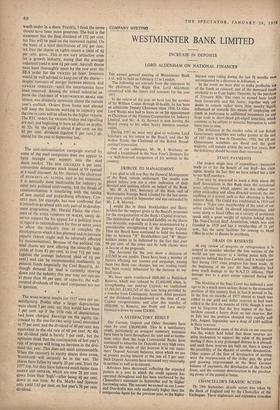COMPANY NOTES
By CUSTOS worth under 3s. a share. Frankly, I think the terms should have been more generous. The bait is the statement that the final dividend of 131 per cent. tax free will be paid on the increased capital. On the basis of a total distribution of 183 per cent. tax free the shares ex rights return a yield of 43 per cent. gross. This is not very attractive even for a growth industry, seeing that the average industrial yield is now 61 per cent. Aircraft shares have been thoroughly upset by the row over the BEA order for the VICKERS jet liner. Investors would be well advised to keep out of the shares— despite rumours of merger between BRISTOL and HAWKER SIDDELEY—until the uncertainties have been removed. Among the mixed industrial re- ports the chairman of WESTINGHOUSE BRAKE AND SIGNAL was distinctly optimistic about the current year's outlook. Orders from home and abroad will keep the factories working to capacity and the rise in costs will be offset by the higher volume. The BTC orders for vacuum brakes and signalling are only just beginning to have an effect on profits. At 32s. 9d. the yield is about 6 per cent, on the 10 per cent. dividend (against 9 per cent.) de- clared for the year to September last.
The anti-nationalisation campaign started by
, some of the steel companies does not appear to have brought any support into the steel share market. The new COLVILLES 6 per cent. convertible debenture stock issued at 99 opened at a small discount. As Mr. Stewart, the chairman of srEwnwrs AN LLOYDS, said in his statement, it is normally most inadvisable for industry to enter into political controversy, but the threat of renationalisation is interfering with the raising of new capital and jeopardising efficiency. CON- sErr IRON, for example, has now confirmed that it intends to go ahead with only part of its develop- ment programme. Mr. Harald Peake, the chair- man of the STEEL COMPANY OF WALES, surely de- serves support for his appeal for a political truce in regard to nationalisation for five or seven years to allow the industry time to complete the developments which it has planned and to increase exports (which might well be adversely affected by nationalisation). Because of the political risk steel shares are now offering the absurdly high yields of from 81 per cent, to over 113 per cent. (against the average industrial yield of 63 per cent.) and can be recommended confidently to pension funds (especially the Coal Board's). Al- though demand for steel is currently slowing down and the industry this year may not operate at more than 90 per cent, of capacity, the well- covered dividends of the steel companies are not in question.
The WOOLWORTH results for 1957 were not un- satisfactory. Profits after a larger depreciation were about 3 per cent, up; they would have been 5 per cent, up if the 1956 rate of depreciation had been charged. Earnings on the equity (in- creased by the one-for-two scrip issue) amounted to 57 per cent, and the dividend of 40 per cent, was equivalent to the old rate of 60 per cent. At 40s, the dividend yield is barely 5 per cent., but the optimists think that the continuation of last year's rate of progress will bring an increase in the divi- dend this year. This does not seem unreasonable. When the recovery in equity shares does come, Woolworth will certainly be in the van. The shares have fallen by nearly 20 per cent, from the 1957 top, but they have behaved much better than MARKS AND SPENCER, Which are now 28 per cent. down from their 'high'—after being 48 per cent. down at one time. At 41s. Marks and Spencer only yield 3.65 per cent, on last year's 30 per cent. dividend.



































 Previous page
Previous page